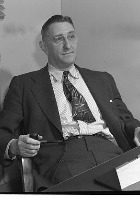Gerald Gould
Gerald Gould Poems
BEYOND the East the sunrise, beyond the West the sea,
And East and West the wander-thirst that will not let me be;
It works in me like madness, dear, to bid me say good-bye;
For the seas call, and the stars call, and oh! the call of the sky!
...
I came to Oxford in the light
Of a spring-coloured afternoon;
Some clouds were grey and some were white,
And all were blown to such a tune
...
I gathered with a careless hand,
There where the waters night and day
Are languid in the idle bay,
A little heap of golden sand;
...
1
Those were our freedoms, and we come to this:
The climbing road that lures the climbing feet
...
'Tis but a week since down the glen
The trampling horses came
--Half a hundred fighting men
With all their spears aflame!
...
This is the horror that, night after night,
Sits grinning on my pillow -- that I meant
To mix the peace of being innocent
...
Gerald Gould Biography
Gerald Gould (1885 – 1936) was an English writer, known as a journalist and reviewer, essayist and poet. He was brought up in Norwich, and studied at University College, London and Magdalen College, Oxford. He had a position at University College from 1906, and was a Fellow of Merton College, Oxford from 1909 to 1916. From 1914 he was an official in Masterman's Wellington House Propaganda Department, which may explain his failiure to produce much poetry concerned with the War. He also worked as a journalist on the Daily Herald as one of Lansbury's Lambs — the group of idealistic young men helping with it after George Lansbury purchased it in 1913, and which included Douglas Cole, W. N. Ewer, Harold Laski, William Mellor and Francis Meynell. It was probably Gould who brought Siegfried Sassoon to the paper as literary Editor after its relaunch in 1919. Gould regularly contributed poetry to the Herald and gave several sonnets to Millicent Fawcett's Common Cause when it became the Woman's Leader in 1920. Gould also reviewed novels for the New Statesman, moving to The Observer as fiction editor in 1920. He was also (not coincidentally) made chief reader for Victor Gollancz Ltd., where he was involved in the early publication history of George Orwell. His poem Wander-thirst is often quoted. Much of his poetry remains buried in the columns of newspapers and periodicals. The few collections that appeared, although well reviewed by contemporaries, are long out of print.)
The Best Poem Of Gerald Gould
Wander-Thirst
BEYOND the East the sunrise, beyond the West the sea,
And East and West the wander-thirst that will not let me be;
It works in me like madness, dear, to bid me say good-bye;
For the seas call, and the stars call, and oh! the call of the sky!
I know not where the white road runs, nor what the blue hills are;
But a man can have the sun for a friend, and for his guide a star;
And there's no end of voyaging when once the voice is heard,
For the rivers call, and the roads call, and oh! the call of the bird!
Yonder the long horizon lies, and there by night and day
The old ships draw to home again, the young ships sail away;
And come I may, but go I must, and, if men ask you why,
You may put the blame on the stars and the sun and the white road and the sky.

I learned this poem at Wix's Lane School in London in 1948. The headmaster Mr Alvey insisted we learn it. I always wondered who wrote it. Gerald Gould, who is a little known poet. I still see the White Road and the Blue Hills in my mind back to those post WW2 years with the silver haired school master reading it. Still a link to another world gone yet still alive in such poetry.